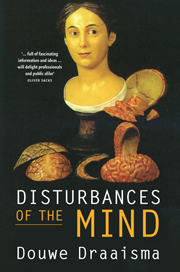Book contents
- Frontmatter
- Contents
- Introduction
- 1 Towards dusk the images appear
- 2 A tormenting round of tremors
- 3 Phineas Gage’s posthumous stroll
- 4 The Celestine prophesy
- 5 Sparks from a Leyden jar
- 6 Siberian brandy
- 7 Go to hell, idiot! Gilles de la Tourette syndrome
- 8 A labyrinth of tangles
- 9 The Mercator of neurology
- 10 The headquarters of madness
- 11 A cup of tea for the doppelgänger
- 12 Little professors
- 13 The Cardan suspension of science
- Index
- References
4 - The Celestine prophesy
Broca’s area
Published online by Cambridge University Press: 05 March 2014
- Frontmatter
- Contents
- Introduction
- 1 Towards dusk the images appear
- 2 A tormenting round of tremors
- 3 Phineas Gage’s posthumous stroll
- 4 The Celestine prophesy
- 5 Sparks from a Leyden jar
- 6 Siberian brandy
- 7 Go to hell, idiot! Gilles de la Tourette syndrome
- 8 A labyrinth of tangles
- 9 The Mercator of neurology
- 10 The headquarters of madness
- 11 A cup of tea for the doppelgänger
- 12 Little professors
- 13 The Cardan suspension of science
- Index
- References
Summary
Like Columbus before him, the discoverer of ‘Broca’s area’ was not sure exactly what he had discovered. The anatomical facts seemed clear enough. In April 1861, in the Bicêtre Hospital in Paris where Broca practised as a surgeon, the death was recorded of a man who had lost the power of speech. When Broca carried out an autopsy on the brain of the deceased, he found severe damage to the lower part of the left frontal lobe. Some of the brain tissue had disappeared, and what remained was pulpy in structure. The conclusion seemed obvious: this must be the part of the brain involved in the production of language. It is a reconstruction favoured by many neurological handbooks: Broca discovered the link between a speech disorder and damage to a specific location in the left half of the brain, thereby becoming the name-giver of ‘Broca’s area’ and the related ‘Broca’s aphasia’. And yet this representation of the facts is misleading. Broca believed he had discovered something quite different. Not until two years later did he realize that he had set foot on land not in Japan, but in the New World. The discovery was not a cause for rejoicing.
- Type
- Chapter
- Information
- Disturbances of the Mind , pp. 97 - 125Publisher: Cambridge University PressPrint publication year: 2009



